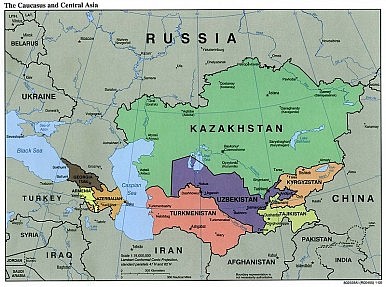Interesting only 2 country that are significant energy producer Kazakhstan for oil and Turkmenistan for gas. both are connected to China with pipeline
Energy in Central Asia: Who Has What?
Kazakhstan, Turkmenistan, Uzbekistan and a breakdown of their energy resources.
By
June 15, 2017
Each summer, BP releases
. The review — in its 66th year — is well regarded and draws on a variety of sources, giving one of the most comprehensive views of energy reserves and consumption around the world.
Buried amid the tables are Central Asia’s three energy-rich states: Kazakhstan, Turkmenistan, and Uzbekistan. As energy plays a central role in the economies of these states, it’s worth taking stock of where the last few tumultuous years have left them.
Of course, what happens in Central Asia’s energy markets is necessarily impacted by global trends. In the review’s intro, BP CEO Bob Dudley writes, “Global energy markets are in transition.” He points to Asia a major arena of growth, rather than “traditional markets” in the OECD. A focus on efficiency has led to stagnating consumption and “environmental needs and technological advances” are shifting consumption toward cleaner sources. For oil, 2016 was a “year of adjustment” and for gas, “global production was essentially flat” with the exception of liquefied natural gas (LNG) exports.
How do these global trends look in Central Asia?
Let’s look at Kazakhstan first. The 2014 cratering of the oil market, a product of geopolitics far beyond the steppe, hit Kazakhstan particularly hard. Oil production in Kazakhstan fell for the third consecutive year (-1.4 percent from 2015 to 2016) to 1.672 million barrels per day. Nonetheless, Kazakhstan remains one of the top producers in the Europe and Eurasia region, behind Russia and Norway and ahead of Azerbaijan.
Astana has been sly about oil production, making tacit promises to OPEC to cut back while also reveling in the
, which came online (again) last fall. Meanwhile, production has fallen at some of the older Kazakh fields, balancing some of the boom at Kashagan.
Natural gas production in Kazakhstan, an energy industry secondary to gas, is much more modest. At the same time, the country’s natural gas production has grown consistently over the last several years, from 19.0 billion cubic meters in 2015 to 19.9, a growth of 4.5 percent. Most of that was exported to Russia by pipeline, with a small amount (only 0.4 billion cubic meters) to China.
Meanwhhile, Turkmenistan’s insular nature and dependence on a single customer has seemed to finally be reflected in its gas production numbers. According to the BP report, natural gas production fell for the first time since 2009, from 69.6 billion cubic meters to 66.8, a decline of 4.3 percent. An overwhelming majority of Turkmenistan’s natural gas was exported in 2016 to China (29.4 billion cubic meters), followed by Iran (6.7 billion cubic meters) and Kazakhstan (1.1 billion cubic meters). According to the report, Turkmenistan exported 37.3 billion cubic meters of gas in 2016.
Given Ashgabat’s
at the start of 2017 these figures are likely to worsen in next year’s report. Turkmenistan lost Russia as customer
. Consumption continues to rise in China, so demand remains for Turkmen gas, but not at the pace of previous years.
In the oil market, Turkmenistan has stagnated. Oil production from 2015 to 2016 remains unchanged at 261,000 barrels per day.
How about Uzbekistan? The country is often described as resource rich, but it doesn’t belong on the same plane as Turkmenistan with gas and Kazakhstan with oil. It also doesn’t belong with Tajikistan or Kyrgyzstan, neither of which merit inclusion in the BP report. Uzbekistan, rather than being energy rich, should perhaps be described as energy diverse.
In terms of oil, Tashkent has seen steady decline in production over the past decade. Oil production in 2016 (55,000 barrels per day) is about half what it was in 2006 (114,000 barrels per day). Following global trends toward cleaner fuels, natural gas production jumped 8.4 percent between 2015 and 2016, the highest growth rate among the individual countries listed from the Europe and Eurasia region in the report. Uzbekistan’s natural gas exports are also more balanced than Turkmenistan’s, with 1.5 billion cubic meters going to Kazakhstan, 5.0 billion cubic meters to Russia, and 4.3 billion cubic meters going to China.
Kazakhstan and Turkmenistan’s reliance on oil and gas, respectively, ties their economies to the whims of those markets. Uzbekistan is a bit more insulated, if only because it is less dependent on oil and gas revenues.
One area which is less explored in the statistical report and vitally important to the future of Central Asia’s economies is renewable energy. BP includes consumption data for hydroelectric and other renewable sources but doesn’t include production for either. We can glean a piece of the production puzzle from electricity generation, which increased in all three states from 2015 to 2016. Kazakhstan generated 94.5 terawatt-hours in 2016, Turkmenistan 22.6 terawatt-hours, and Uzbekistan 58.9 terawatt-hours (increases of 2.8, 4.7, and 1.9 percent, respectively).

